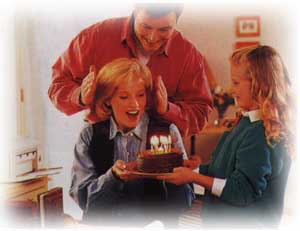
|

|
Jewish World Review / March 27, 1998 / 29 Adar, 5758
By Lisa S. Lenkiewicz
MARCH IS A big birthday month for our family. In just one week, we celebrate
four of them. A fortune is spent at the card shop, and the phone bills
skyrocket as my brothers and I brainstorm about the perfect gifts
(eventually it falls to me to decide and they simply ask, "How much?"). Caught up in all
the shopping frenzy, I began to wonder: How important are birthdays in
Judaism?
We know there are certain milestones in our tradition: at the age of three, a
boy gets his first haircut; at 13 a person is counted as an adult for a
minyan; one is said to have lived a full life at the age of 70; and we
extend
birthday wishes by saying, "May you live to 120." But what Jewish rituals
are
there for celebrating birthdays? The answer seems to be very little.
I searched my Judaica library for references to birthdays. There are
several
items on how Rosh Hashanah is called, Hayom charas olam (Today is the
birthday of the world). But I was searching for contemporary birthday
references. According to the Encyclopedia Judaica, "The celebration of
birthdays is unknown in traditional Jewish ritual." The only reference to a
birthday in the Bible is one celebrated by Pharaoh (Gen. 40:20). In some
synagogues, special prayers of thanksgiving are recited on significant
birthdays, such as 50th, 70th, 80th, etc.
Bringing Jewish spirituality to our children
In Rabbi Hayim Halevy Donin's book, To Be a Jew, we learn that when we
want to remember a person, we recall their yahrzeit, their date of death, not
date of birth. We remember the person who departs this world having done good
deeds. We don't remember the date that person entered the world, for it is
not known then how that person will turn out. Donin quotes King Solomon in
reference to this point: "A good name is better than precious oil; and the
day of death than the day of one's birth"(Ecclesiastes 7:1).
Superstition comes into play also. Jews don't like to rejoice too much;
calling attention to a joyous occasion may tempt the evil eye. When there
was a simcha in our family, barely a sentence went by without my grandparents
(of blessed memory) using the words, "Kayn aynhoreh" or, "no evil eye" in
Yiddish. As in, "You children are getting so big, kayn aynhoreh."
Many religious Jews won't tell you the precise number of children they have.
I once asked an Orthodox rabbi whom I knew had a large family, "Exactly how
many children do you have?" "Exactly...I don't know!" was his clever reply.
quickly realized he wouldn't give me a number, not wanting to tempt fate.
A wonderful article from Moment Magazine was published in 1996, noting how
birthdays can be an opportunity to introduce spirituality to our children.
Here are some ideas the authors of that article suggest:
Last week was my birthday. It fell this year on a Friday, and so the arrival
of my 41st year (didn't you just read about me turning the big 4-0?)
coincided with Shabbes. Usually, we celebrate at the area restaurant which gives you a
discount if it's your birthday. We decided instead to go to a Shabbes dinner
at the local Young Israel for a "Shabbat Across America" program. After the
meal, a huge birthday cake was rolled over to my husband and me (his birthday
is five days after mine), and everyone sang "Happy Birthday" in Hebrew. We
were so touched (we aren't even members of the shul!). It was a beautiful
way to celebrate.
A prominent rabbi once suggested spending birthdays as a day of reflection and study. "Because time itself is like a spiral," he wrote, "something special happens on your birthday each year: the same energy G-d invested in you at birth is present once again."
The challenge is what we do with that
 The Birthday gift
The Birthday gift
New JWR contributor, Lisa S. Lenkiewicz, is managing editor of the Connecticut Jewish Ledger.